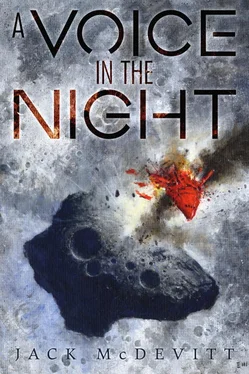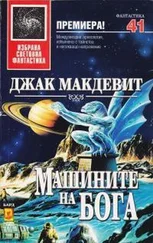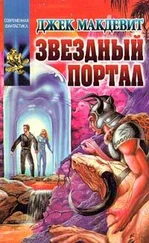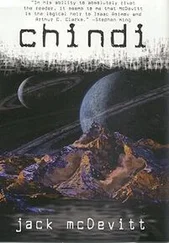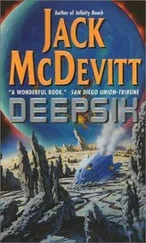“Yes, Mr. Holmes.”
“Where did they come from?” He was looking at the notebooks.
“His father found them in his office. A few weeks ago. They were thinking about disposing of them but decided to show them to me first. Asked if I could make any sense of them.”
“You’ve checked the handwriting?”
“Yes. It’s Steve’s.”
I was getting bored. It was starting to rain, and watching people outside scurrying for cover was more interesting than the conversation. “Why,” I asked, “do we care? So your cousin came up with relativity first. And kept it to himself. But it’s a subject nobody understands. What’s the difference?” Emil took a deep breath. He was disappointed in me. “I’m serious. I understand you feel an obligation to your cousin, but beyond that, why would it matter?”
Emil glared at me. “This from the guy who’s always going on about reality. And truth.”
“Sometimes an issue really has no significance,” I said. “Suppose we found out that somebody knew about evolution before Darwin? Or discovered electricity when Ben Franklin was three years old. What difference would it make?”
Holmes seemed focused somewhere else. Then: “But wouldn’t we be curious as to why the person who figured out evolution before Darwin didn’t say anything?”
A waiter finally arrived and took our orders, informed us of a special, and left. Watson watched as he returned to the kitchen. “Easy answer there, Holmes,” he said, without returning his attention to the table. “You start talking about evolution in the last century and you get into trouble with the Church. I suspect that’s about over, fortunately, but in Darwin’s time it was a serious hazard.”
“I can’t argue with that,” said the detective, who was possibly not quite as infallible in real life as he was in Watson’s accounts. “If these documents are valid, is there any conceivable reason that Addington would have remained silent?”
Emil shook his head in frustration. “It makes no sense to me.” His eyes were fixed on Holmes. “Can I persuade you to look into it?”
“I must confess it’s of interest,” said Holmes.
“May I ask how much your services would cost?”
“Let’s discuss that later, Dr. Kohler.”
“Okay. I just wanted you to understand I don’t have substantial resources.”
“I’ll require contact information. Addington’s parents, Gordon, and the girlfriend. Amy Daniels, I believe you said. “
“I can provide that now.”
“Good. Watson, I’ll need your help on this.”
Watson looked momentarily disrupted. “Holmes, I’m leaving tomorrow for my Scotland tour.”
“Oh, yes. I’d forgotten.”
“I can help,” said Emil. “Just tell me what you want.”
“Unfortunately, that won’t work.”
“Why not, Mr. Holmes?”
“Because you’ve already spoken to these people.”
“Why’s that a problem?”
“They’ve given you a set of responses. That means they’ll be predisposed to remain consistent.”
“Are you suggesting someone lied to me?”
“No, not at all. But they may have embellished, or forgotten, or exaggerated. I want them to realize they are receiving a fresh start.” Those intense eyes locked on me. “Mr. Mencken, have you a day or two to spare?”
“I’d be pleased to help, Mr. Holmes. But I doubt I’d qualify as a detective.”
“Not necessary. All I need is your presence. To reassure everyone that they are engaged in a quiet conversation, and not a police procedure.”
Watson offered to put me up for the night, but he was leaving on an early train in the morning, so it would not have been convenient. My hotel, however, was on his route home, so we shared the ride. We talked about the weather, and he asked what writing projects I was then occupied with. I explained that my editorial job with the Baltimore Sun kept me busy. “By the way,” I added, “you have a serious writing talent, John. Are you, at some point, going to produce something other than crime reports?”
He rearranged himself on the coach seat, trying to decide whether to read that as a compliment. “Probably not, Henry. They’re very popular, and I’m making far more money than I ever did as a physician.”
“But,” I said, “twenty years from now, these tales will have played out, Sherlock Holmes will have been forgotten, and, barring a change in direction, so will you. We both know it’s not all about money. Have you considered, perhaps, doing some historical novels? Those, when handled by a master, have a tendency to survive. War and Peace and A Tale of Two Cities will never grow old.”
“Thank you for the encouragement, Henry. But I suspect no one will ever confuse me with Tolstoy or Dickens.”
Steve Addington came from money. His parents, George and Emma, lived in a villa on Old Street, in an area crowded with trees and high-rise buildings. Holmes asked the driver to wait. We climbed down out of the coach, walked through a gate, mounted half a dozen steps onto a veranda, and rang the bell.
The door was opened by a short, heavy-set man with a ridge of white hair and eyes that reflected pain. “Mr. Holmes?” he asked, unsure which of us would respond.
“Yes. Good morning, Mr. Addington. This is my associate, Henry Mencken. Thank you for agreeing to see us.”
“It’s an honor, gentlemen. Come in, please.” He led us to a sofa and invited us to sit. A woman entered from another room. “My wife, Emma.”
Emma was blonde. She flashed a quick smile, but she too appeared discomfited. She went immediately to the point: “I always thought there was something strange about the way Steve died. He’d never had a health problem. Then he got into a coach and hours later he was gone. Pray, Mr. Holmes, are you bringing news?”
“No, no, Mrs. Addington. Nothing like that. Those things do happen. We lose people sometimes without warning. And apparently without reason.”
“Then what,” she said, “brings you here?”
It was obvious who was in charge. One more example why no man with half a brain should ever marry. I settled onto the sofa. A cool breeze was reaching us through open windows. Outside somewhere, children shouted and laughed. A coffee table held copies of Jane Eyre , David Copperfield , and a Shakespeare collection. Several pieces of art adorned the walls. One was a portrait of a rather formal couple who did not look as if they’d ever laughed. Another was a landscape, mountains and a waterfall, illuminated by moonlight.
“It’s probably Steve’s notebooks,” her husband said.
“That’s correct.” Holmes lowered himself into an armchair. “There’s nothing wrong. But your son seemed to be far ahead of everyone else in his research.”
“I’m not surprised to hear that,” said Emma.
“Do you know what he was working on?”
“We do now. It was the same as that Einstein person. Relativity.”
George smiled. “Neither of us is a scientist. I’ll confess I have no idea what relativity is about.” He turned to his wife. “Did he ever talk to you about it?”
Emma shook her head, and her lips tightened. “Not really. He didn’t think we were smart enough to understand what he was doing.”
“Did he say that?”
“No. He would never have said anything like that. But it was clear enough that’s what he thought.”
“That’s not fair, Emma. He tried a few times to explain it. He talked about particles and light and I don’t know what else. Neither of us ever had a clue what he was trying to say. Other than that Isaac Newton needed revising.” He smiled as he said it, but Emma turned angry eyes in his direction. “It’s not fair to blame him,” George continued. “It was just over our heads. Or at least it was certainly over mine.”
Читать дальше
